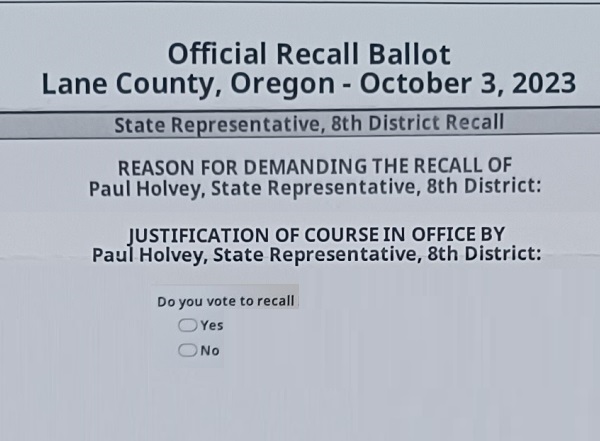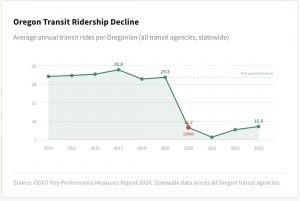Dan Isaacson defends Rep. Holvey in recall election; union conflict goes to voters
7 min read
Voters received ballots this week asking whether to recall Rep. Paul Holvey. Recall sponsors question whether Rep. Holvey did all he could do to support cannabis workers wanting to form a union.
At the intersection of the cannabis industry and recall elections, one River Road business owner campaigned against Claire Syrett’s recall but also testified in support of House Bill 3183: Dan Isaacson.
Dan Isaacson: Just to talk about the bill itself, I mean, it’s an emerging industry. It went from the shadows to the light. And at the same time, it’s not. It feels oftentimes when you’re in the industry as though: ‘I’m living in 1850.’ If there’s no cotton gin for marijuana—that apparatus, the machinery, the labor, the stores—they don’t exist yet. The banking doesn’t exist.
[00:00:48] So all of the things that a normal business would forget because it just exists—the idea that, ‘Well, of course you can just go down to the bank,’ or ‘I can go onto Amazon and get whatever I need,’ doesn’t exist. And so you have to make it. It’s a lot like an island, where if you didn’t bring it, it’s not here.
[00:01:05] Here in Oregon, we’ve kind of worked out a lot of the kinks, but a lot of the kinks are structural and institutional that aren’t going to go away until the federal government quits treating us like fentanyl dealers (which is totally bizarre). Although there’s been some pretty significant movement just this past week on that (which is, you know, phenomenal), but nonetheless, it is what it is.
[00:01:24] And so the state is running afoul of federal law and doing so with kind of a passive allowance by the federal government, provided we stick to two facets, which is that we limit and we’re enact out limits and completely restrict access to minors, which is great and to restrict as much as we possibly can, a diversion into the black market. and that those two things happen the easiest when we have a good relationship with state regulators and that we see it as a partnership.
[00:01:55] That has been, from my own personal experience, a fairly smooth transition. Some people have a more rocky transition. The people that I deal with at OLCC (Oregon Liquor and Cannabis Commission) have always been very caring and trying to navigate themselves. I mean, they just kind of got thrust into it themselves too. They woke up one day and found out, ‘I’m going from alcohol to cannabis and have to learn all the nuances of it.’
[00:02:16] And so with that industry change, you get a scenario where, much like banking is a traditional aspect of normal business, so is labor practices and overtime and payroll taxes and Federal Medical Leave Act (FMLA) and all the other things that go with it—time off for paternity leave. You have people who are trying to navigate that whole world.
[00:02:38] And so you have a scenario where one particular union wanted to be able to unionize its workers, its farm workers, especially, which is a good thing. In my experience the people who work out in the fields are the most susceptible to exploitation.
[00:02:55] We saw it during the Holiday Farm Fire where it’s both 100 degrees outside as well as having the worst air quality in the world, where we had an 800 score on the air quality index where 80 is hazardous to your health. So 10 times that level. And there was no effort to protect those workers or to make sure that they had adequate breathing apparatuses or health care if they were sick or had asthma, there’s no support whatsoever.
[00:03:24] So that is ripe for exploitation along with wage theft and everything else.
[00:03:29] John Q: On Feb. 27, over 600 people—including Mr. Oregon—offered testimony in support. Dan Isaacson’s statement began: ‘I wanted to express my thanks and support for HB 3183.’ It ended by saying: ‘Please add my name to any list or tool-belt used to pass this important legislation.’
[00:03:50] Dan Isaacson: So the idea that a union would see that as an opportunity to protect worker rights is a natural and expected outcome.
[00:03:58] But unfortunately as it relates to the labor law, labor law is guaranteed by the National Labor Relations Act, which means it’s federal. Until the federal government quits treating us as though we are a cocaine dealer, then we are bound to those rules. So what UFCW wanted was a particular language that would have run afoul of federal law.
[00:04:22] John Q: The union challenges what they call the ‘myth’ that HB 3183 is illegal. Explaining Rep. Holvey’s side:
[00:04:31] Dan Isaacson: The Legislative Counsel’s Office, which looks at every single bill before and after it’s submitted by a state legislator and said, ‘This is not going to work. You’re going to have to change some things if you want it to be able to work.’
[00:04:45] UFCW kind of dug in their heels and felt that it did not run afoul of the law, but what is curious about that is, that it’s very easy for me to say, ‘Oh, it doesn’t run afoul of the law. I want you to pass it.’ And if you do, then you spend the money to defend it, as opposed to going the state ballot route where I would have to defend it and it would be on my dime.
[00:05:07] And on the one hand, it’s very easy to say, ‘Yeah, not only is it fine, but you should pay the bill.’ And so, Rep. Holvey put it into the Rules Committee.
[00:05:17] This is a little bit of sausage-making, but put it in the Rules Committee where the union had the opportunity for several months to make the changes or meet with legislative counsel and work out whatever differences there were.
[00:05:28] And it died on the floor when nothing was done by the end of the legislative session. They’re free to enter it in the next session if they want, but it is what it is until they make the change, or the federal government makes its change, which based on the news this week could be as early as next summer.
[00:05:45] I will also say, as someone in the industry the hope and the dream that the federal government is going to do something as it relates to either rescheduling or descheduling or the banking bill tend to be a bit of a mirage in the desert.
[00:05:59] And there have been a lot of people who have walked out in the desert thinking that they saw water and died.
[00:06:01] John Q: The recall website explains why the union says the legal risk was exaggerated: Similar laws are already on the books in New York, New Jersey, and California. Defending Rep. Holvey:
[00:06:14] Dan Isaacson: UFCW does represent other cannabis institutions in Oregon right now, and they’ve done it in a way that doesn’t violate federal law and works with state law. SpaceBuds is a dispensary in town. They voted two years ago for the staff to have a contract and have been working through that process already.
They could, if UFCW had wanted, been able to represent that farm worker in the field with an 800 air index and do it in a way that would be consistent and applicable with federal law. They chose not to. They chose to want to have language in there that would violate the federal law. So this isn’t the state making a decision. This is UFCW wanting to both advance the football forward (as they should) for worker rights, but want the state to pick up the tab of fighting that battle for them legally, and I don’t think as a taxpayer that’s our job.
[00:07:03] Our job is to press Congressman Hoyle and our entire delegation to advocate for the rights of the 36,000 people who work in our industry in our state and make sure that they’re protected at the federal level.
[00:07:18] John Q: Paul Holvey should consider that to be his job, according to the union. Local 555 says to get around federal rules, some cannabis businesses try to misclassify workers as agricultural employees. They say Rep. Holvey would know this, except he was ‘manning a desk in a marble building for the last 20 years, while UFCW members and organizers have been out at worksites actively trying to organize.’
What happens if a majority of votes are ‘Yes’ to recall?
[00:07:48] Dan Isaacson: The precinct committee people who are elected by the Democratic voters in their area would make the selection of three to five names that then would go on to the county commissioners.
[00:07:58] And, you know, my, my concern would be if your goal is to have somebody who would be a ‘labor champion,’ right, because that’s the way that’s being framed is, ‘We want somebody who will support this particular labor union.’ And if you only judge a person by a single vote—in this case, Paul Holvey’s one particular—and not even one particular vote, one particular action on this bill—that seems like a very shortsighted view to take as opposed to the totality of his labor record.
[00:08:25] And there’s no guarantee that you get the next guy or gal who will be any more or less labor-supportive than Paul Holvey is. So it seems like, you know, I would be hesitant to use the phrase ‘(The) devil you know is better than the devil you don’t,’ because Paul Holvey is not a devil. He’s a remarkable labor champion and everyone is not only bewildered, but just totally flummoxed by the argument that he isn’t (a labor champion), because of one bill.
[00:08:56] It’s just the most bonkers thing I’ve ever heard in my life.
[00:08:53] John Q: Local 555 goes all out to recall Paul Holvey, and now it’s up to the voters. You can read statements for and against on your official recall ballot. Then follow the instructions to vote by Oct. 3.







